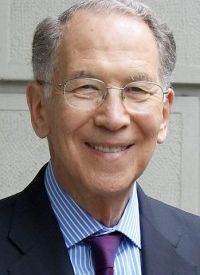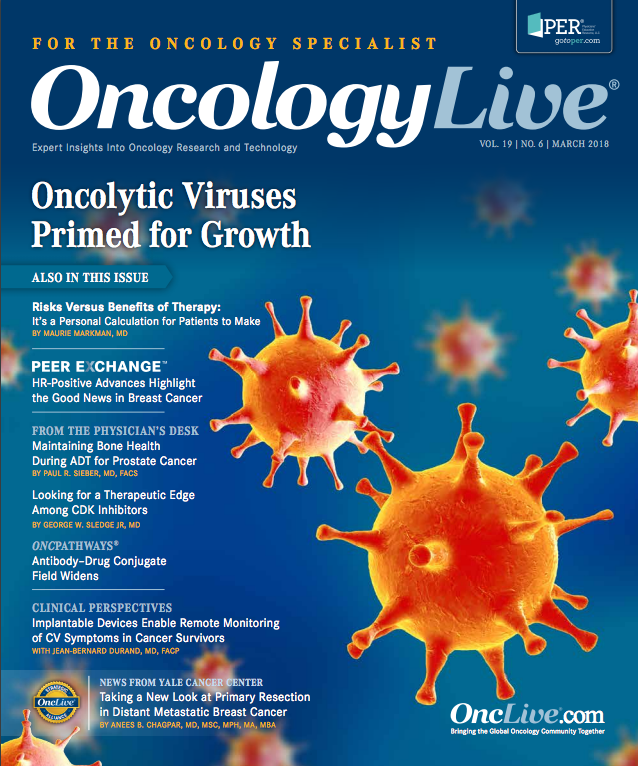An Early Voice for Breast Conservation Therapy Reflects on a Changing Field
As a trailblazer who helped breast cancer treatment evolve from radical mastectomy to the judicious use of radiation therapy with limited tumor removal, Samuel Hellman, MD, is considered one of the world's premier radiation oncologists.
Samuel Hellman, MD

Samuel Hellman, MD
As a trailblazer who helped breast cancer treatment evolve from radical mastectomy to the judicious use of radiation therapy with limited tumor removal, Samuel Hellman, MD, is considered one of the world’s premier radiation oncologists.
Now in his mid-80s, Hellman began his medical training in an era in which the reigning breast cancer protocol was to cut it all out, including the entire breast and underlying muscle, and possibly radiate the remaining area afterward. But Hellman always pushed for less extensive surgery and a stronger emphasis on radiation, and his reputation was well known.
In 1983, Hellman was recruited to, and eventually joined, New York’s Memorial Sloan Kettering (MSK) Cancer Center as physician in chief. MSK was known for its team of surgeons, and many, if not all of them, typically performed full mastectomies for treatment. Once he took on the role, someone asked Hellman how he and the surgeons would get along.
“I said, ‘The way porcupines make love: very carefully!’” Hellman recalled, laughing.
His dedication to radiation oncology and speaking out against the status quo has been a hallmark of his career. “I became the leading American proponent, in speeches and debates, for the conservative management of women who had breast cancer,” said Hellman. “At the time, I was the chairman at Harvard and I had the bully pulpit. I think most people would say I was the one who really fought the surgeons and brought it to people’s attention.”
He was also living by one of his favorite philosophies: all patients need not be painted with the same broad brush of how to treat their cancer. “Medical science is general, but patient care is given individually. The essence of the ‘art of medicine’ is in applying that medical knowledge to each unique patient,” he said.
The challenges of radical mastectomy were many: Patients were more likely to cite concerns or unhappiness about their changing body image with the full loss of 1 or both breasts, the likelihood for postsurgical complications was greater with a more extensive surgery, and patients faced the risk of restricted arm and shoulder use post mastectomy. Throughout the 1970s and 1980s, Hellman, along with other oncologists working in the United States, Europe, and Canada, pushed for breast cancer treatment with biopsy or limited tumor removal with radiation. Ultimately, randomized trials conducted by others comparing the results of radiation therapy versus surgery successfully supported Hellman’s stance, and the use of radical mastectomy as the leading breast cancer treatment has since been almost completely eliminated.
Leading the Way
“I think I made a real contribution to breast cancer treatment, but it was more political by engaging in the academic debate than it was in making a discovery or inventing the treatment,” Hellman said in a 2002 interview that the American Society for Therapeutic Radiology and Oncology (ASTRO) conducted as part of its efforts to document the history of radiation oncology. He also began writing up case studies of patients who had been treated more conservatively, which attracted wide interest after being published in peer-reviewed journals.Hellman has spent decades as a pioneer in radiation oncology. After his postgraduate medical training at Yale and in Great Britain, he established the first Department of Radiation Oncology at Harvard Medical School in 1970, a feat he considers one of his greatest contributions to the field. He was the founding professor and director of Harvard’s Joint Center for Radiation Therapy and was appointed the Alvan T. and Viola D. Fuller-American Cancer Society Professor and chairman of the Department of Radiation Therapy.
When he was recruited from Harvard to become the physician in chief at MSK in 1983, he was thrilled. “The implication of the title and job itself was really what I loved,” he said. “I was now in charge of all clinical cancer care.” He stayed there until 1988, when he was recruited to become the dean of Biological Sciences at the University of Chicago and vice president of the university and its Pritzker School of Medicine. In 1993, he was named the A.N. Pritzker Distinguished Service Professor in the Department of Radiation and Cellular Oncology at the university. He is currently an emeritus faculty member in the Radiation and Cellular Oncology Department at the University of Chicago.
Hellman has also served as president of ASTRO and was the first president of the American Society of Clinical Oncology who was a radiation oncologist.
In addition to his contributions to breast cancer treatment, Hellman has been instrumental in technological developments, such as the introduction of the linear accelerator for stereotactic radiosurgery. He also was recognized for advancing the understanding and management of Hodgkin disease.
Today, Hellman sees himself as being in active retirement. He may have left his practice in 2006 and teaching a few years after that, but he remains busy. His latest book, Learning While Caring: Reflections on a Half-Century of Cancer Practice, Research, Education, and Ethics, is a compilation of Hellman’s essays and articles discussing how medicine has evolved, including insights on medical ethics and learning, academic medicine, research, cancer perceptions, and heroes.
Hellman is also well-versed in the written word, having co-edited, with Vincent T. DeVita Jr, MD, and Steven A. Rosenberg, MD, PhD—both Giants of Cancer Care® award winners— 7 editions of Cancer: Principles and Practice of Oncology, the leading oncology textbook. He also co-edited the annual Important Advances in Oncology from 1988 through 1995, as well as 4 editions of AIDS. With others, he has coedited 5 sequential textbooks on breast cancer and has written or co-written more than 300 published medical articles.
The Early Years
Hellman served on the science advisory committee and is currently a member of the board of directors for the Ludwig Institute for Cancer Research, a global private cancer research organization. “The great advances for cancer right now are immunological, and the Ludwig was a very early funder of that,” he said. “The Ludwig and the book are a very active part of my life in retirement.”Hellman had always wanted to be a physician, but found radiation oncology after being dissatisfied as an internal medicine intern in the late 1950s. “I wanted a field where you dealt with serious disease, not just complaints that were easily handled or psychological,” he said. “I wanted to treat serious illness and had the opportunity for a cure. I couldn’t figure out what to do, so I thought I’d take a radiology residency. I became a resident at Yale, and in those days, I had to take a year of radiation oncology, which I essentially knew nothing about. My year began after a 9-month rotation in diagnostic radiology, when I realized this was it. I wanted radiation oncology because I could actually do something for people, those who really had disease, and not something the tincture of time would help. You had to do something, and that all appealed to me.”
Hellman’s mentor at Yale was Morton M. Kligerman, MD, known as “Klig”, who was the chair of radiation oncology. “He had a real understanding of what the future would be, and he saw that I needed to learn molecular biology.”
After Hellman finished medical school in 1959, at what is now known as the State University of New York Upstate Medical University, he went to Yale and then on to the Royal Marsden Hospital in London on a fellowship that Klig helped him secure.
Family Matters
“I didn’t want to be someone who looked at radiation and what we could do with it. I wanted to be an oncologist who specialized in radiation, but whose expertise was primarily in understanding cancer,” he said. “The physicians at the Royal Marsden were superb oncologists and that’s what was very important to me—their interests were more in understanding cancer.”Born in 1934, Hellman grew up in the Bronx, New York, in a middle-class neighborhood filled with “working people who took the subway; not many people had cars,” he said. The family then moved to Long Island, where Hellman finished his final year of high school. He attended Allegheny College in Meadville, Pennsylvania, “quite determined to be a doctor.” The experience was revelatory, he said, in that he found himself among people from the white majority as opposed to the religious, racial, and ethnic diversity he knew in New York City.
What's Ahead
From there, Hellman was accepted at State University of New York Upstate Medical University, based in Syracuse. While there, he met his wife, Marcia, when they went on a blind date arranged by Hellman’s best friend’s sister. In June 2018, they will celebrated 61 years of marriage. They have a daughter, Deborah Hellman, who is a law professor at the University of Virginia, and a son, Jeffrey Hellman, an attorney in Connecticut. Samuel and Marcia also have 4 grandchildren. Today they live in Charlottesville, Virginia.ellman has been particularly interested in oligometastases, or why some tumors have only limited numbers of metastases. He helped introduce the concept of oligometastatic disease in the mid-1990s, an observation that contributed to the use of local ablative approaches, including radiation therapy, in several tumor types.
“We need to find those people whose tumors haven’t learned to be efficient in the metastatic process and see if they can be cured by destroying these limited metastases, using radiation or surgical excision,” he said. “I believe that with early diagnosis and modern imaging methods, this could be a significant population.” Hellman has worked with Ralph Weichselbaum, MD, at the University of Chicago on molecular studies designed to identify such oligometastatic patients.
Looking forward, Hellman believes in immunotherapy and molecular targeting to enable cancer treatment to be more precise and efficient. “I’ve been at this game a very long time. When I started, chemotherapy was used for tumors that grew rapidly, and a useful class of agents was developed, but often they had significant limitations and were quite toxic,” he said. With immunotherapy, “You reverse the cancer-produced inhibition of the immune response to cancer, and when you do that, you allow the immune system to destroy the cancer. Unfortunately, that release of the immune system can have some deleterious effects. Similarly, the molecular targets of precision drugs that are targeted to abnormal genes overly expressed in the tumor may also affect targets needed for normal cell function.” he said.
“Cancer is not a bacterial or viral disease, where the target is foreign. While I am skeptical of the ease with which we will make advances, we are making progress. It is well to realize that cancer is the most curable of chronic diseases, but sometimes the treatments are significantly harsher than we would like. I am optimistic and believe that our glass is half full rather than half empty.”




